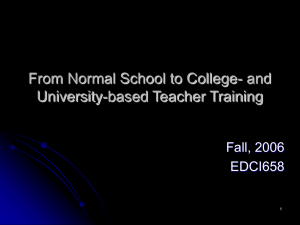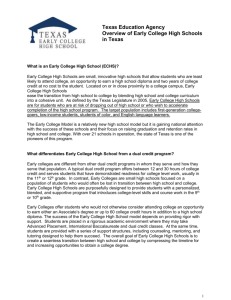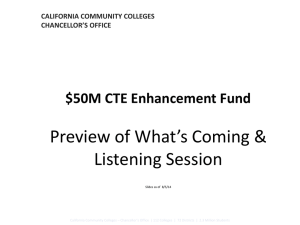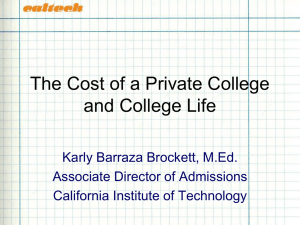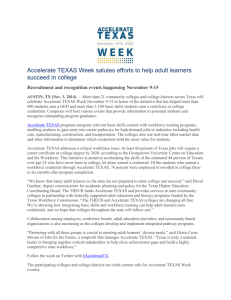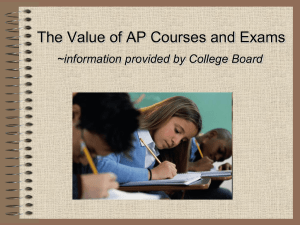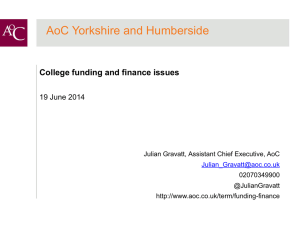Accelerate Texas: Braiding Funding to Support Students and
advertisement
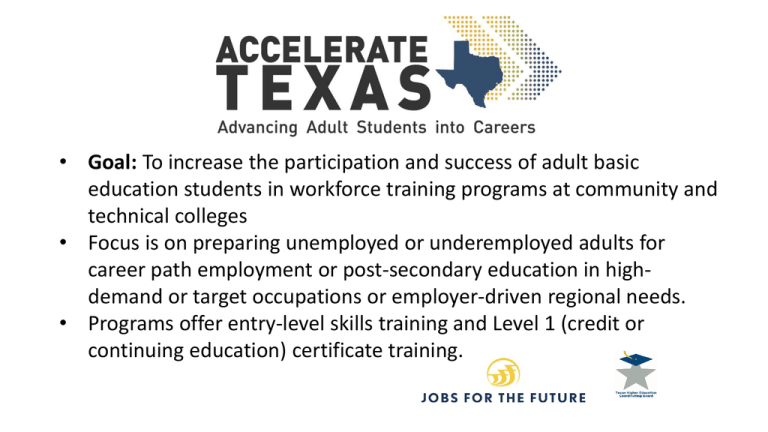
• Goal: To increase the participation and success of adult basic education students in workforce training programs at community and technical colleges • Focus is on preparing unemployed or underemployed adults for career path employment or post-secondary education in highdemand or target occupations or employer-driven regional needs. • Programs offer entry-level skills training and Level 1 (credit or continuing education) certificate training. ACCELERATE TEXAS • Students with 6-8.9 grade skill levels • No more than 25% with high school credential • Continuing education (mostly) and credit programs • Concurrent enrollment (mostly) or Team Teaching instructional models • Emerging state implementation team; THECB as lead has provided professional development support (with JFF) • State general revenue dollars + a lot of other funding ACCELERATING OPPORTUNITY • Students with 6th grade skill levels and above • Some students may have high school credential • Credit level programs with at least 12 credits for first credential • Team teaching with 25% instructional overlap • Required state level implementation team and supports (policy, professional development, braided funding) + JFF and national partners • Foundation collars + a lot of other funding Common Elements Include: • Partnerships with WIBs and employers • Emphasis on High Demand Occupations • Career Exploration and Navigation • Stackable Credentials and Career Pathways • Accelerated Learning (integration, contextualization, technology-enabled, etc.) • Comprehensive Student Supports (internal and external) • Engagement of college leadership and local Implementation Teams • Data Driven Program Implementation Accelerate Texas Colleges (2010-2013) Results of Accelerate Texas Programs • Eight Colleges began enrolling students in integrated programs in January 2011; Six colleges began programs in January 2012; Seven colleges began programs in January 2013 • As of October 2013, among these 21 colleges, over 3,766 students had enrolled in continuing education and credit programs, with 2269 having received workforce training certificates. Accelerate Texas Mentor Colleges Mentor Colleges are leading colleges from 1st and 2nd grantee cohorts who have achieved strong program implementation results. With support from JFF, and through coaching and other capacity building activities, they are assisting new grantees, and potential grantees in planning stage, around integrated program development and implementation . • Alamo Colleges • Amarillo College • Houston Community College • Lone Star College System • South Texas College State Level Partnership –THECB and TWC • Creating a Shared Vision to Support Under-Prepared Adults • Connecting Adult Education to Career Pathways • Aligning Professional Development Opportunities • Braiding Funding to Support Programs and Students Some Innovative Braided Funding Strategies at Local Level • South Texas College: Use of TPEG and Resources from Community Partners • Alamo Colleges: Aligning Multiple Funding Sources in Comprehensive Approach • Amarillo College: Leveraging Federal Funding Through TAACCCT • Houston Community College: Reduced Tuition for Accelerate Texas students • Lone Star College: Leveraging Funding from Individual Colleges in Districts


